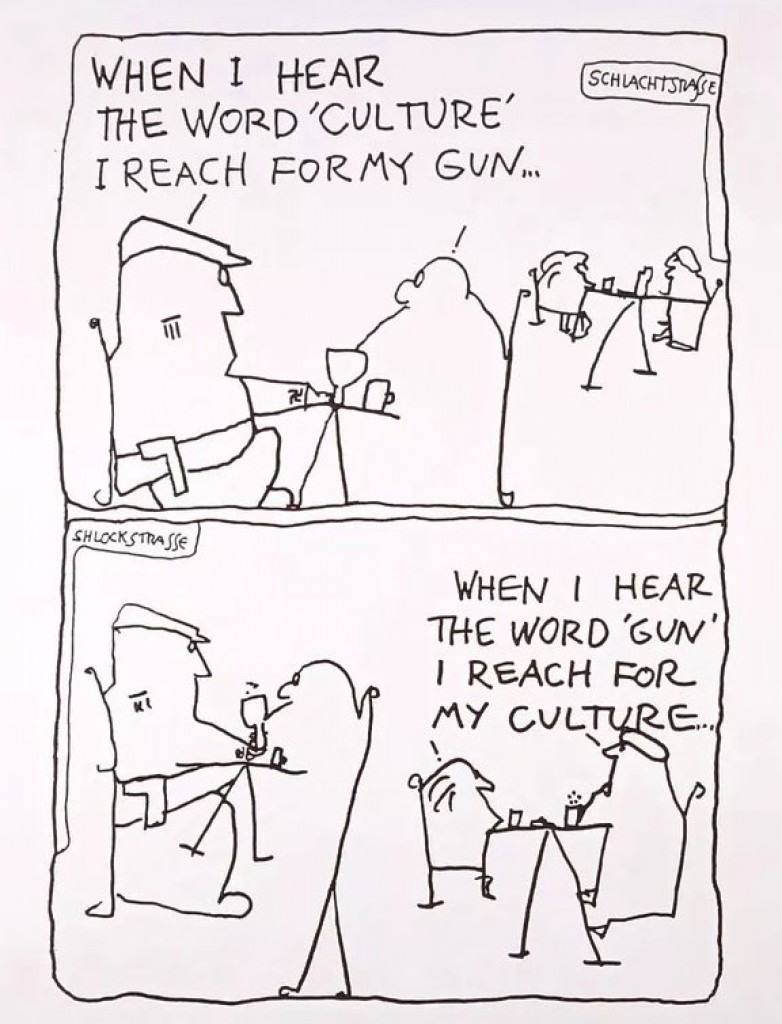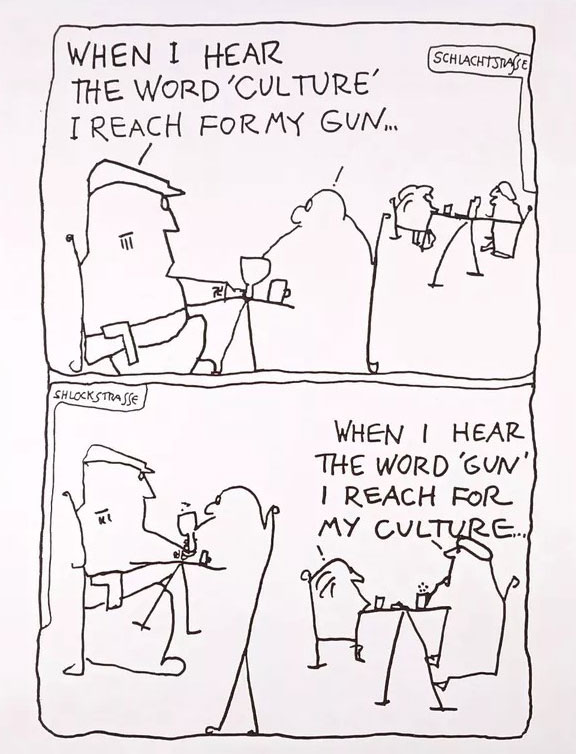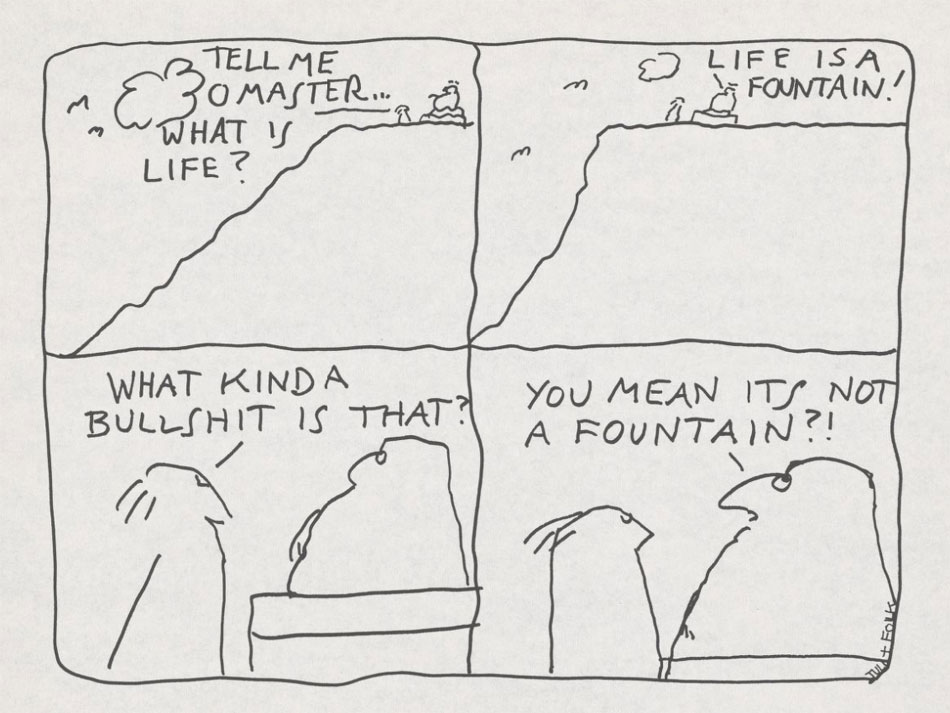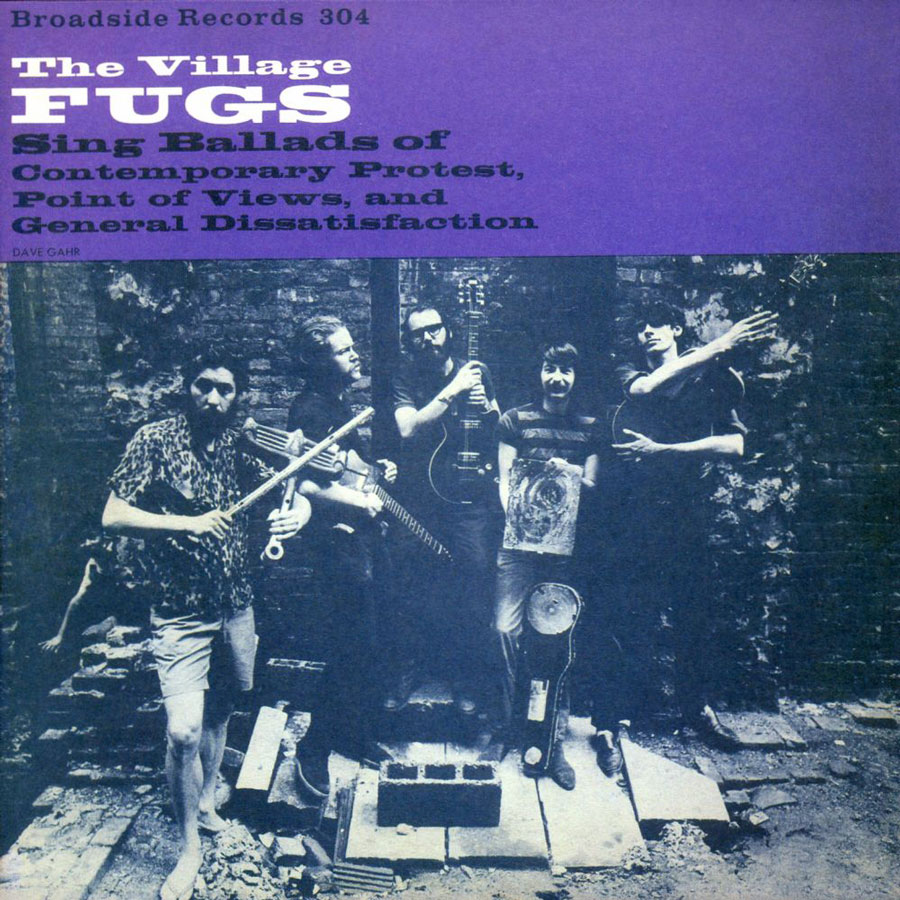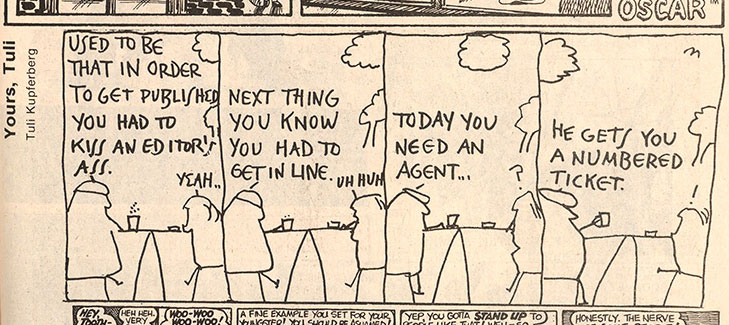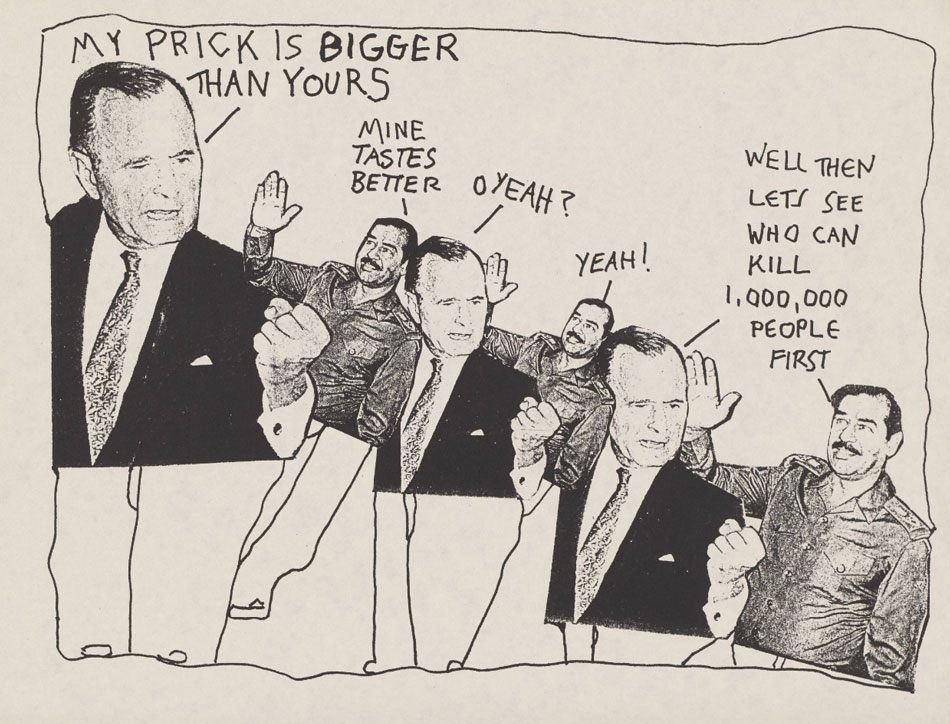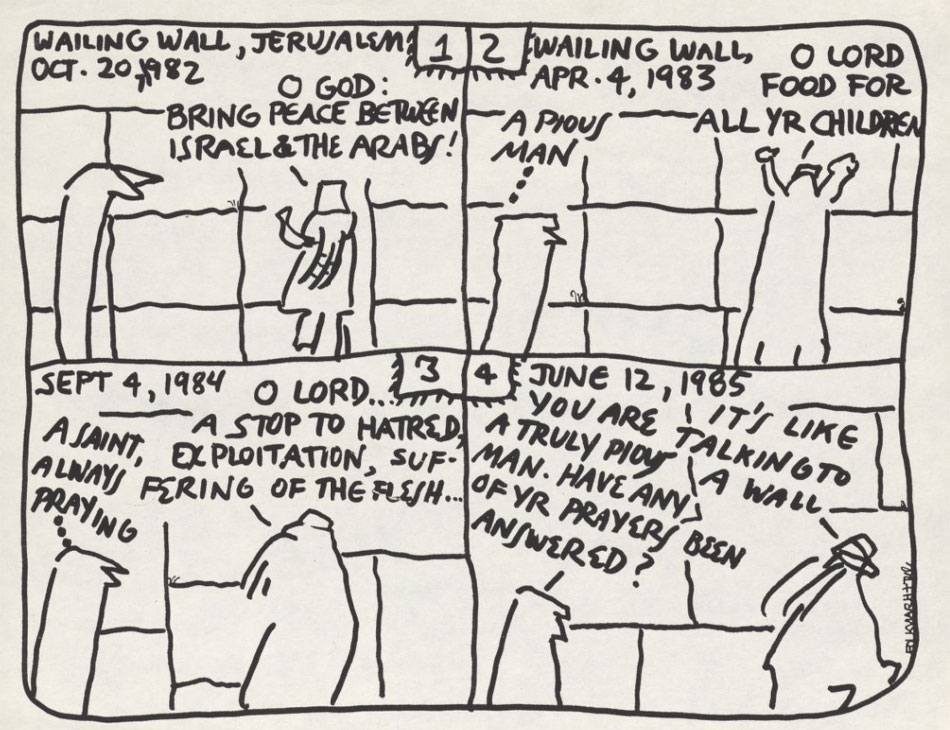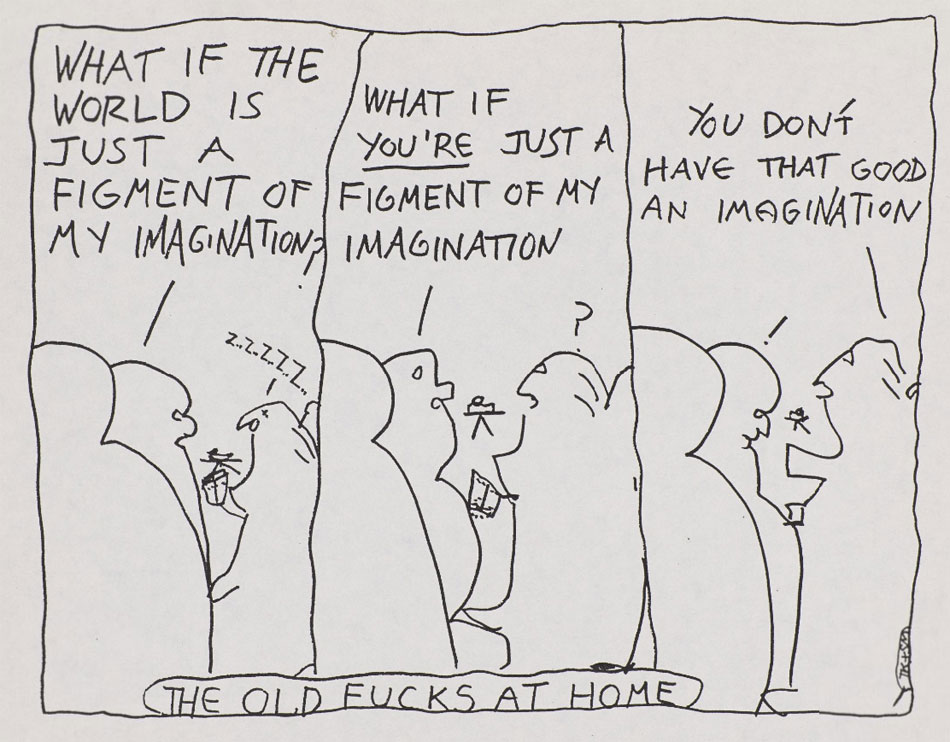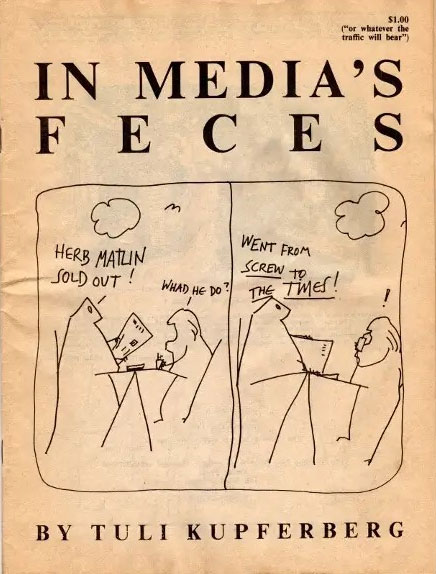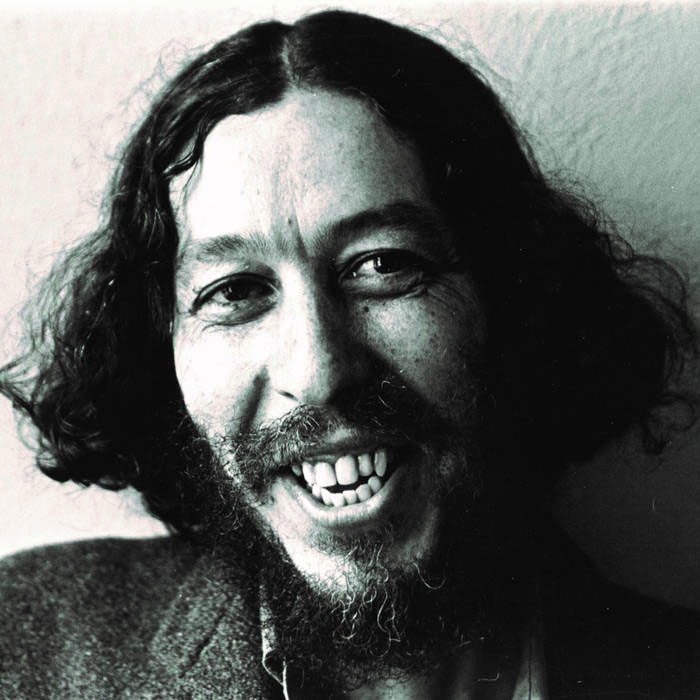Kupferberg strip from 1960, poking fun at Nazi playwright Hanns Johst's famous quote: 'When I hear the word "culture", ... I release the safety on my Browning!", which is often misquoted as: "When I hear the word "culture", ... I reach for my gun!" and misattributed to Nazi leaders Hermann Göring, Heinrich Himmler or Joseph Goebbels.
The American artist Tuli Kupferberg is best remembered as a member of the underground rock band The Fugs, who caused controversy in the 1960s with their songs about sex, drugs and politics. Their obscene and profane lyrics taunted censors, while their anti-war activism caused them to be shadowed by the FBI. As a solo artist, Kupferberg was active as an anarchic poet, essayist and cartoonist. He wrote several humorous pamphlets, including his signature work, '1001 Ways to Beat the Draft' (1966). His comics and cartoons are a mixture of political-religious satire and odes to sex, printed in counterculture magazines like The Village Voice. Just like his entire body of work, they symbolize freedom of speech. Along with Peter Blegvad, Herman Brood, Kurt Cobain, Yamatsuka Eye, Daniel Johnston, Jon Langford (Chuck Death), John Lennon, Bent Van Looy and Charlie Watts, Kupferberg is one of the few rock musicians who once drew comics.
Early life and career
Napthali Kupferberg was born in 1923 in New York City as the son of a Jewish retail store owner. His business failed three times. Interviewed by Jason Gross (June 1997), Kupferberg recalled that their family was on the brink of having to rely on welfare, which fed his social consciousness from an early age. Living through the Great Depression, he became concerned with the common man and hung around with Trotskyite groups in Manhattan. His first poem was printed in 1942, while he was still in high school. In childhood, people nicknamed him "Tuli", to which he later officially changed his first name. Kupferberg became a lifelong pacifist, vegetarian and anti-establishment activist. His daughter recalled that he didn't even kill cockroaches or mice, but just caught them and set them free elsewhere.
Raised Jewish, his parents spoke mostly Yiddish at home. Kupferberg's lifelong partner Sylvia Topp recalled that when they first met, he spoke very little English. Still, Kupferberg abandoned religion by the time he was 12, refusing to do his bar mitzvah, since his grandmother told him "Jewish boys don't whistle." During World War II, he was drafted and sent to the medical examination. When he filled in the insurance form in case he would die in combat, the doctor noticed that he didn't write down the names of his parents as the people who would inherit his belongings. When he asked him for his reasons, Kupferberg replied that he "hated" his parents and his father had "mixed feelings about him being sent off to war." The doctor took pity on him and labeled Kupferberg "4F" (not acceptable for military service).
Kupferberg studied psychology and English at Brooklyn College, graduating cum laude in 1944. While he started a course in sociology, he soon dropped out. He worked several odd jobs, including stretching animal skins in a factory, helping out in a bookstore and being a delivery boy. In 1944, he tried to commit suicide by jumping off Manhattan Bridge. This incident was later mentioned by Allen Ginsberg in his classic poem 'Howl', which spread the rumor that Kupferberg just swam to shore afterwards, claiming nobody saw or cared about his failed suicide attempt, which made him reconsider life. In reality, a passing tugboat pulled him out of the water. Severely injured, he spent six months in a hospital. Kupferberg always felt embarrassed that his bridge jump had been romanticized into a sensational stunt, while it was actually the lowest point of his life. In the early 1950s, he found a more enjoyable profession, working as a medical librarian, replying to letters from people who subscribed to an encyclopedia.
Kupferberg comic strip about religion.
In the 1950s, Kupferberg lived a bohemian lifestyle in Greenwich Village, joining the Industrial Workers of the World and the War Resisters League. He became part of the beatnik subculture, writing poems and pamphlets, some of which he sold on the street or to bookstores, while others were printed in magazines like The Berkeley Barb, The East Village Other, International Times, Liberation, Midstream, Other Scenes, the Village Voice and his own publication, Birth (1958), which lasted three issues. Together with his wife Sylvia Topp, he established Birth Press, where she helped out with designs and lay-out. Throughout the 1950s and 1960s, he published several humorous poems, plays and essays. Many are notable for their anti-authoritarian stance, criticizing religion, politics, the army, war, capitalism and censorship. Among the titles are works like 'Beatniks, or, The War Against the Beats' (1961), '1001 Ways To Live Without Working' (1961), 'I Say To Masturbate Is Human, To Fuck Divine' (1966), '1001 Ways to Beat the Draft' (co-written with Robert Bashlow, 1966), 'Fuck 'Nam: A Morality Play' (1967) and '1001 Ways to Make Love' (1969). Out of these, '1001 Ways to Beat the Draft' has become Kupferberg's best-known work. Like the title promises, it summarizes 1001 different methods to escape the military draft. Some realistic, others more absurd. The pamphlet was reprinted by Grove Press in 1966, gaining more popularity during the Vietnam War (1965-1973).
The Fugs
While visiting bookstores to distribute his literary output, Kupferberg met Ed Sanders, owner of the Peace Eye store in East Village, Manhattan. The store was a magnet for all kinds of counterculture personalities, from Allen Ginsberg and Abbie Hoffman (of 'Steal This Book' fame) to Andy Warhol. Sanders had his own literary magazine, Fuck You (1962-1965), in which he printed anything people would offer him under the banner of "free speech". Kupferberg and Sanders discovered they had a lot in common. They both came from Jewish backgrounds, were active as poets and shared many of the same convictions. Interviewed by Richie Unterberger (1999), Kupferberg recalled: "(...) I was shocked at first by Ed's language. But (...) I swiftly caught up to the freshness of his so-called vulgarity and the honesty of his attitude towards sex."
In 1964, influenced by the breakthrough of The Beatles and The Rolling Stones, Kupferberg and Sanders decided to establish their own rock band. They brought in Ken Weaver (drums) and former Holy Modal Rounders members Peter Staempfel (guitar, vocals) and Steve Weber (guitar, vocals). Unlike these three members, Kupferberg and Sanders had no musical background, but Sanders decided to become a singer anyway, while Kupferberg took care of percussion. Both men also wrote lyrics. They weren't bothered by their advanced age either (Sanders was 25, Kupferberg already 40). The group named themselves The Fugs, based on a euphemism from Norman Mailer's novel 'The Naked and the Dead' and deliberately chosen since it sounded like "The Fucks". The Fugs started performing in local New York City clubs, gaining notoriety for their audacious mixture between poetry, music, theatrical antics, left-wing political activism and explicit references to sex, drugs and swear words. At the time, no other band was so uncompromisingly outspoken regarding these topics, criticizing the U.S. government and the Vietnam War. From this viewpoint, they perfectly embodied the free-spirited 1960s.
The Fugs built up a strong underground reputation and, despite being too obscene and subversive to ever be picked up by mainstream media, they eventually recorded and released two albums, the first titled 'The Village Fugs Sing Ballads of Contemporary Protest, Point of Views, and General Dissatisfaction' (1965, later reissued as 'The Fugs' First Album') and the second 'The Fugs' Second Album' (1966). On the second record, Weber was replaced by Pete Kearney. Together with Frank Zappa's Mothers of Invention and the Velvet Underground, the Fugs were among the earliest alternative rock bands. They barely made any money and received no radio airplay, but by word-of-mouth promotion still managed to gain a strong cult following. They were best experienced live, where they could provoke and excite listeners. The Fugs also performed at benefit shows and joined anti-war demonstrations. In 1967, they challenged the authorities by performing a mock exorcism in front of the Pentagon and Joseph McCarthy's grave.
As could be expected, not everybody appreciated their anti-establishment stance. The FBI shadowed them, on New Years' Day 1966 the police raided Sanders' bookstore and, due to many death threats, he removed his telephone number from the official telephone guide. The Fugs kept releasing new albums, like 'Virgin Fugs' (1968), 'It Crawled Into My Hand, Honest' (1968), 'The Belle of Avenue' (1969) and the live record 'Golden Filth' (for which Cal Schenkel illustrated the cover, 1970). The band split in 1970. In the early 1970s, Fugs drummer Ken Weaver lived together with future underground comix artist Aline Kominsky, later the wife of Robert Crumb. The Fugs reunited in 1984. Their final albums were released in 2003, 'Be Free! Final CD Pt.1', and 2010, 'Be Free! Final CD, Pt.2'.
Solo career
Outside of his career as a Fug, Kupferberg released a solo album, 'No Deposit, No Return' (ESP, 1966) that remains very rare. The record doesn't contain music, but features him reciting strange advertisements, read in an ironic tone, accentuated by wacky sound effects. After the Fugs split, Kupferberg formed two new musical groups, The Revolting Theater and The Fuxxons, who were stylistically comparable to The Fugs. He had a memorable appearance in Dušan Makavejev's cult movie 'WR.: Mysteries of the Organism' (1971), a satirical film exploring the link between sex and politics. In one segment, he walks around, dressed as a soldier, playing with his gun as if he's masturbating it, while The Fugs' song 'Kill for Peace' plays on the soundtrack. He also played God in Jack Christie and Michael Hirsh' experimental film 'Voulez-Vous Coucher Avec God?' (1972). In 1988, he released another solo album, 'Tuli & Friends' (Shimmy Disc, 1989).
Throughout his long life, Kupferberg kept busy writing poems and drawing cartoons, some of which directly inspired by newspaper articles, his so-called "newspoems", of which he released two volumes, 'Newspoems' (1971) and 'Less Newspoems' (1981). He had his own columns in the magazine High Times, 'Dope Lore: 1001 Thoughts About Dope' and 'Ask Dr. Fuck', where readers could write him questions about drugs and sex. From 1977 on, he had a weekly segment on 'The Coca Crystal Show: If I Can't Dance, You Can Keep Your Revolution', from 1982-1983 also broadcast on Paper Tiger Television, while his own cable TV show 'Revolting News' (1992) was broadcast on Public Access Network. In the late 2000s, he uploaded a daily self-invented "perverted" proverb, nicknamed "perverbs" on his YouTube channel.
'Yours, Tuli' strip from Zat #5, 1984.
Cartooning career
Kupferberg always enjoyed drawing cartoons and gag comics and started as early as the 1950s. He ranked George Grosz as his favorite artist. Just like his musical career, Kupferberg didn't care whether his artwork was sophisticated and just drew for the fun of it. His minimalistic drawings were distributed through little booklets and, from the 1980s on, appeared in counterculture weeklies like Against the Current, The Artworkers News, Freedom, Home Planet News, New York Press, The Shadow, Street News, The Village Voice and WIN. Between 1984 and 1985, they ran in Zat, a magazine published by the SohoZat store in Soho, New York City. Other notable cartoonists in Zat were Mark Beyer, Bill Griffith, Jay Lynch, Gary Panter, Art Spiegelman and Gary Whitney. According to the interview by Benito Vila with Kuperberg's daughter Samara (30 October 2020), Kupferberg archived his cartoons in personal file cabinets.
Collage strip with George Bush, Sr. and Saddam Hussein, 1990 or 1991.
Most of Kupferberg's cartoons were political or religious satire. They poked fun at U.S. Presidents Richard Nixon, Ronald Reagan, George Bush Sr. and George Bush Jr., while simultaneously taking the piss out of Minister of Foreign Affairs Henry Kissinger, Secretary of State Dick Cheney, U.S. businessman Donald Trump and foreign heads of state, including British Prime Minister Margaret Thatcher, Elizabeth II, Israeli Prime Minister Yithzak Shamir, PLO leader Yasser Arafat, Soviet leaders Leonid Brezhnev and Yuri Andropov and Iraqi dictator Saddam Hussein. Others poked fun at God, Jesus, Moses, Muhammad, Buddha, the Pope and religious fundamentalists. But Kupferberg also discussed counterculture figures like Henry Miller, John Lennon, Bob Dylan, John Belushi and former priest Philip Berrigan, who married a former nun, Elizabeth McAlister, and both devoted their lives to non-violent civil disobedience and peace activism.
Many cartoons were directly inspired by then-current events. The Israeli-Palestinian conflict is referenced in a 1985 cartoon in which a Jewish man prays in front of the Wailing Wall that peace will come, only to have the years just pass. When an observer praises his piousness and asks him if any of his prayers have been answered, the other replies: "It's like talking to a wall." Sometimes Kupferberg directly added a photocopied newspaper article to give context. When Steven Spielberg won seven Oscars for his Holocaust drama 'Schindler's List', a newspaper headline read: "Spielberg sobs after winning Oscar awards: this is for the 6 million who died". This rather awkwardly phrased headline inspired Kupferberg to add the wry commentary: 'Great moments in the history of journalism: Hooray for Hollywood: "I went to the gas chambers and all I got was this lousy Oscar."'
Some cartoons and comics by Kupferberg revolve around sex. In one, a man asks a woman: "Do you want to have a child?", when she replies "No.", he answers: "Do you want to practice?". In another, a man brags that he "slept with 100 women", only to add: "Only fucked two of 'em, tho'". Kupferberg's cartoons have no real recurring characters, though some have the title 'The Old Fucks at Home' and depict an elderly couple sitting in front of the television, commenting on the news.
While Kupferberg drew most of his cartoons on his own, he sometimes cut out works by others, praising their cleverness and relevance, like cartoons by Art Young and Ernie Bushmiller's infamous 'How to Housebreak Your Dog'. Some of Kupferberg's cartoons were also visualized in collaboration with British anarchist cartoonist Donald Rooum. On his personal YouTube channel, Kupferberg once showed an example of this, 'A Short History of the Human Race'.
Kupferberg published three large cartoon books during his lifetime, 'Questionable Cartoons' (Vanity Press, 1981), 'In Media's Feces' (Strolling Dog Press, 1986) and 'Teach Yourself Fucking' (Autonomedia, 2000). According to his wife Thelma, Kupferberg didn't always sign his cartoons, because some were so radical that he could be held responsible for them. But since he didn't want to be paid for them, it didn't matter anyway.
'In Media Feces' (Strolling Dog Press, 1986).
Death, legacy and influence
Tuli Kupferberg died in 2010, at age 86, from a stroke. He once considered a fitting epitaph for his life and life in general: "What the hell was that?". The Fugs broke new ground as one of the earliest alternative rock bands, if not the very first. They were an important part of 1960s U.S. counterculture, while their DIY, anti-establishment attitude can be considered a precursor to the punk movement. In fact, many of Kupferberg's poems and cartoons in the 1950s already included photocopied newspaper articles and collages, very similar to the punk press from the late 1970s on.
The Fugs and Kupferberg's work have been admired by celebrity fans like poet Allen Ginsberg, novelist Amy Tan, film directors Joel & Ethan Coen, rock stars Bob Dylan, Lou Reed and Patti Smith, and cartoonist Matt Groening, who placed '1001 Ways To Beat the Draft' at number 47 in his personal list of '100 Favorite Things'. The 1975 underground comix book Felch Cumics, of which the cover was illustrated by Robert Williams, took its title from the word "felch", used by Fugs singer Ed Sanders to describe someone licking sperm from a person's asshole after anal sex. Coincidence or no coincidence, a copy of his comic was later confiscated by police officers to use as proof in an obscenity case, but they eventually lost their "evidence" and thus the trial was dropped. The Fugs couldn't have wished themselves a greater inspirational honor!


